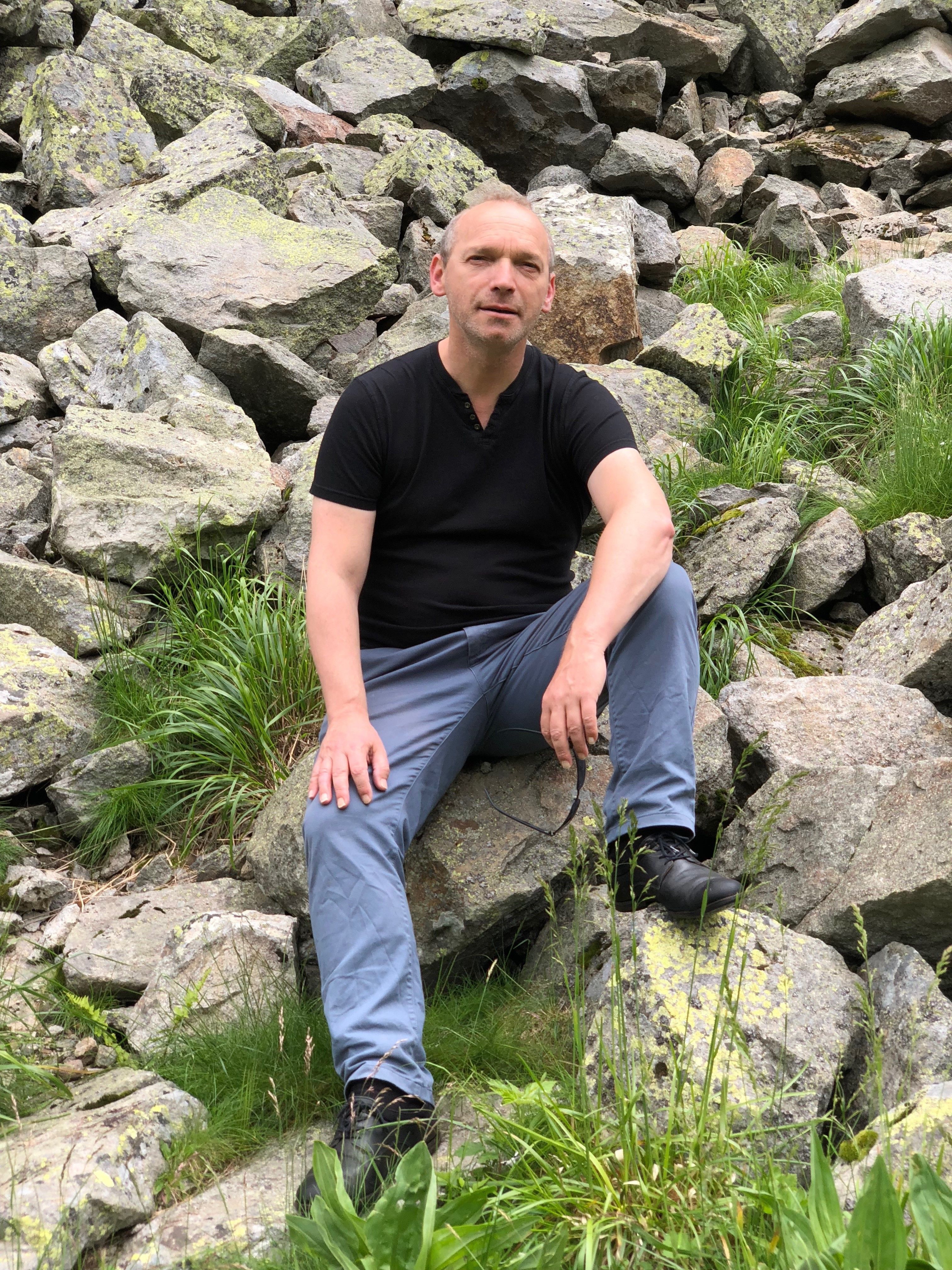A Fairy Tale Come True
It makes me so happy when people tell me they like the Icelandic language!
Eric Boury is a prolific translator of Icelandic books into French. In the past years, he has translated works by authors such as Arnaldur Indriðason, Jón Kalman Stefánsson, Guðbergur Bergsson, Steinunn Jóhannesdóttir, Einar Már Guðmundsson and Árni Þórarinsson, to mention but a few authors. His list of translations is now at the fifty titles-mark.
Dreams of language and of the far North
When asked what made a man born and raised in France, and endowed with the rich culture native to that country, interested in a small and less developed micro-culture of a country in the North Atlantic, Boury says that his background and the cultural world of Iceland are in fact more similar than one might think. “I am born and raised in a rural area, in a farmland culture. I come from a tiny village called Sainte-Sévère-sur-Indre and culturally speaking, my background is more like the West Fjords that central France. During my childhood in the ‘80s and ´90s, the village was very isolated and the community very small. And the yearning for the exotic takes many forms; some dream of distant southern Islands, but as a young man, I dreamed of unknown languages and the North.”
Armed with one textbook, Eric began studying Swedish at the age of 16. Soon, he learned that the oldest Nordic language was Icelandic, which fueled his interest in that language. Later he entered at a university in Normandy to study the Nordic languages and after two years, he headed for Iceland to get up close and personal with the language of his dreams. He lived in Iceland for two years.
“I stayed at a farm in Eyjafjörður, a fjord in North Iceland, for two months and there were a lot of new experiences and challenges for me, but there was also a lot that reminded me of my childhood years. In my home, there weren´t many books around, but on the farm in Eyjafjörður the walls were covered in books. I felt completely at home,” Eric adds, smiling warmly at the memory.
A translator without knowing it
Eric had just turned twenty when he came to Iceland in 1987. Two years later, he went back to France to finish his degree in English, with a diploma in teaching for polytechnic college. Jean Renaud, Head of the department of Nordic studies and an active translator, asked Eric to take on some teaching in Icelandic, and things snowballed from there on. “After a couple of years, Jean Renaud suggested that I enter Sorbonne University in Paris to do a doctoral thesis, which meant I had to start on my second Master´s thesis, which was on Icelandic Women´s literature. I had to translate a lot of the texts I was using as sources and Régis Boyer, my advisor for my Master´s, told me that I seemed to be a very good translator – something that had, quite frankly, never occurred to me.
I had never considered becoming a translator, but these encouraging words prompted me to try and my first project was 101 Reykjavík by Hallgrímur Helgason. I did need a lot of convincing, actually, since the book is full of local puns and word play and it seemed to me a practically impossible task to translate it properly. I did, however, agree to take it on and it turned out surprisingly well. My publisher told me that I was already a translator without really knowing it, and the reason might be that I have always been a writer myself. You see, if a translation is to work, the translator must be able to express himself in writing in his native language.” Eric adds that from this point on, there really was no turning back. “My next project was My Love, I Die by Kristín Ómarsdóttir and then along came Arnaldur, whom I have been translating ever since – at the moment, I am putting the final touches on Myrkrið veit, his latest novel.“
Above all, the text has to work
Eric Boury says that translating is an interesting task, with new and exciting challenges every day. “The Icelandic language has a different rule set from the French and there are a lot of things that you can do in Icelandic that simply don´t work in the same way in French. This is something that has become increasingly clear to me as the years go by. For example, Icelandic has a great tendency to repeat itself, but one doesnt really notice it when simply reading in the language. I don´t notice it myself until I start translating, then it suddenly becomes obvious, and it is just as obvious that you can´t really do this in French. This does not mean that a text is badly written in the Icelandic; it´s simply a matter of style. But the French language abhors repetition, so a translator has to be very careful if the text is to work properly in the French, which is the most important thing.”
I know that it is a cliché that writers, books and translators are builders of bridges between different cultures, but at a seminar like this one, it doesn´t feel like a cliché – just the simple truth. You can literally see it happening. It´s a fairy tale come true.
A cliché, I know!
Last autumn, the Icelandic Literature Center hosted a seminar for translators of Icelandic literary works in Iceland. The seminar was a great success and Eric Boury and Victoria Cribb, translator into English, received the honorary award Orðstír, which is awarded to translators of Icelandic literary works into foreign languages.
Eric says that seminars like this one are extremely important for working translators, not least translating can be lonely work at times. “It is great fun to attend a seminar like this one, the participants were around thirty and we just couldn't stop talking. Not all of us knew each other previously, but we quickly figured out that we had a great many titles in common, which creates a bond and a shared experience. I know that it is a cliché that writers, books and translators are builders of bridges between different cultures, but at a seminar like this one, it doesn't feel like a cliché – just the simple truth. You can literally see it happening. It´s a fairy tale come true. I met translators who have translated the same books as I have, which means that I know what they have gone through, can even sympathize a little with the struggle they got tricked into,” Eric says with a twinkle in his eye, and adds: “And even though you don´t know everybody, the seminar quickly becomes a gathering of friends from all over the world and before you know it, we feel like we know each other.”
I don´t want to just translate crime novels, or just “fine literature”
Eric has taken on a huge variety of authors and genres through the years and he says he feels it is important to work with all types of text. “I don´t want to just translate crime novels, or just “fine literature”. Actually, I´ve never worked on plays or poetry, expect when there are bits of poetry in the novels I have translated. I have never translated a whole book of poems or a collection of poems, mostly because there is very little demand for that kind of literature in France. Over there, people feel that a poet should go and find some “real work”. As if it isn´t hard work to be a poet – it is in fact very strenuous work, but unfortunately, this is a widespread opinion in France.”
Eric stresses that when he is translating Arnaldur Indriðason or Árni Þórarinsson, the work process is in fact no different than when he is working on a book by Jón Kalman, or Sjón. “My friends who read the books I translate often ask me how I manage to work with so many different styles of writing and I have to explain to them that these are not my work, but the authors´. My task is to capture and preserve the style of each work. For example, by now I have translated 17 titles by Arnaldur and feel very much at home when I open a book by him, which sometimes feels very nice – but then you feel the need for a fresh challenge, as well.”
Icelandic literature in France
Eric says that generally, Icelandic literature is warmly received in France. For example, Jón Kalman has recently been nominated for both the Médici Award and the Femina Award for The Story of Ásta. “The Médici is the biggest award with a category for translated works and the Femina is also very significant, so these are important milestones,” Eric says, pointing out that Jón Kalman is in fact in France at the moment, promoting The Story of Ásta. “He´s had full houses at every venue and it is thrilling to see how well the book has done over here.”
It sounds like elfish!
Through the years, Eric has been a strong ambassador for Icelandic literature, a task he says can be both rewarding and entertaining. “For many readers, it is very important to get to hear how the language sounds, even if they don´t understand a word of it. To listen to the language and then be able to read it in translation. After a reading event, people often approach me and tell me how beautiful they find the language. They think it sounds like “elfish” and although that sounds a bit cheesy, it´s also nice. It makes me so happy when people tell me they like the Icelandic language!”
Interview by: Magnús Guðmundsson, September 2018.
English translation: Halla Sverrisdóttir.

